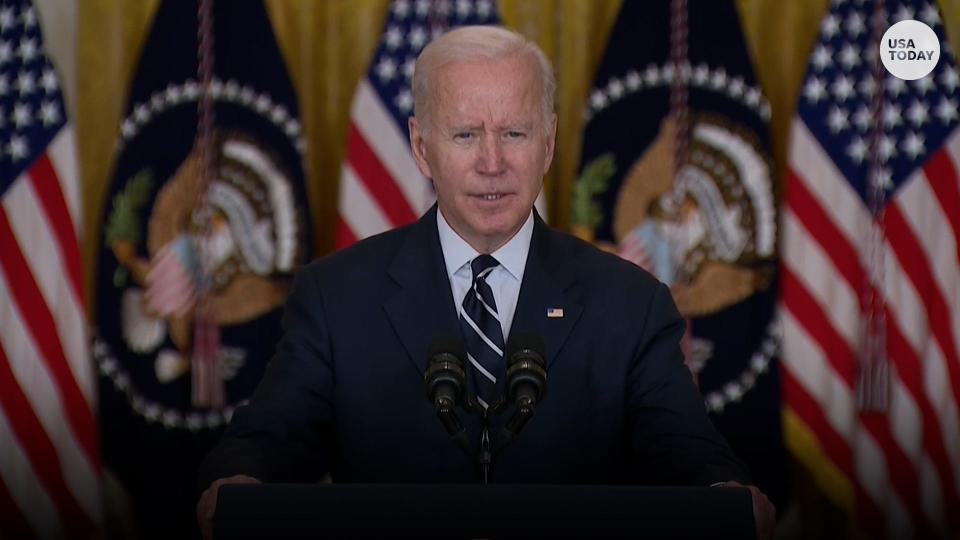Under Biden's new budget offer, 'Choice Neighborhood' grants for affordable housing could be expanded to more cities
- Oops!Something went wrong.Please try again later.
One of the U.S. Department of Housing and Urban Development's signature programs could see one of its biggest expansions since its creation a decade ago, as part of the Biden Administration's new budget offer promising to deliver the biggest one-time investments in affordable housing in U.S. history.
HUD's Choice Neighborhoods program is different from more traditional housing projects that focus solely on building and repairing affordable housing units or expanding voucher programs. Under the latest initiative, cities and communities are able to apply for grants that do wide-scale revitalization efforts.
Grants can be used toward repairing housing stock, creating new spaces for grocery stores and rehabilitating parks, linking residents to public transportation and health services as well as increasing early childhood programming.
Funding for the Choice Neighborhoods program was included as part of President Joe Biden's latest offer to Congress on his Build Back Better plan to expand U.S. safety net programs on Thursday, after months of debate among lawmakers.
“With the Build Back Better plan, we have a once-in-a-generation opportunity to invest in our communities and deliver for families. Among the historic housing investments the President has called for, the Choice Neighborhoods Initiative is one that stands to gain," U.S. Housing and Urban Development Secretary Marcia Fudge told USA TODAY. "This is our time to make a lasting change.”
Over the course of the last decade, the program has awarded nearly $1.2 billion to 40 communities nationwide.
Fudge traveled to Cleveland along with Sen. Sherrod Brown, Chairman of the U.S. Senate Committee on Banking, Housing and Urban Affairs, a Democrat from Ohio, for the groundbreaking of one of the newest recipients on Friday.
HUD awarded the Cuyahoga Metropolitan Housing Authority and the city of Cleveland a $35 million grant under the signature program in May.
"Investments in Ohio communities, like the Buckeye/Woodhill project, support families and kids, improve health outcomes and invest in neighborhoods left on their own for too long,” said Brown.
He added: "Congress and the Biden administration are taking clear steps to make more investments like this."
In Cleveland, Jeffery K. Patterson, CEO of the Cuyahoga Metropolitan Housing Authority welcomed the news during the event. Patterson said one of the biggest upsides of the program is its flexibility.
"It calls for the implementers of the grant to reshape and revitalize a neighborhood through the lens and aspirations of its community," said Patterson.

Some housing experts agree.
"What works in these Choice Neighborhoods is that projects are viewed holistically, they are part of a larger community where opportunities and assets exist; schools, transportation, jobs, health care, access to healthful foods," said James Carras, adjunct lecturer in Public Policy at Harvard University's Kennedy School of Government in Cambridge, Massachusetts.
Others say much more needs to be done.
"We need to radically rethink all housing - from public to private, single to multifamily - in order to improve our subsidized and public housing models," said Akira Drake Rodriguez, assistant professor at the University of Pennsylvania's Weitzman School of Design and Social of Social Policy and Practice.
Every year, the number of Choice Neighborhood awards HUD provides depends on how much funding Congress appropriates, typically four to five implementation grants and 10 planning grants.
As part of the administration's new framework, the funds are rolled into the proposed $150 billion for affordable housing — less than half the $327 billion from Biden's original plan — that will include money to rehabilitate more than 1 million new homes, rental assistance, down payment assistance and financial incentives to support zoning changes that will bolster add more mixed-income units in residential areas.
For civil rights groups and advocates it is also a positive step in addressing housing discrimination that has historically and disproportionately impacted communities of color.
“The funding in this bill is a strong and historic investment in communities that have long faced discrimination in our nation’s housing market, said Lisa Rice, National Fair Housing Alliance President and CEO, an organization dedicated solely to eliminating housing discrimination based in Washington D. C.
When it comes to Choice Neighborhoods, however, urban policy experts say the long term impact of the program will depend on its expansion as the funds only go to a few communities a year as well as buy-in from public and private sectors.
"To fully restart a local economy in a dis-invested place," said Brett Theodos, Director of the Urban Institute's Community Economic Development Hub, "Choice Neighborhoods will need to be combined with other public and private projects and supports."
This article originally appeared on USA TODAY: Choice Neighborhood programs to expand if Biden's new budget deal passes

